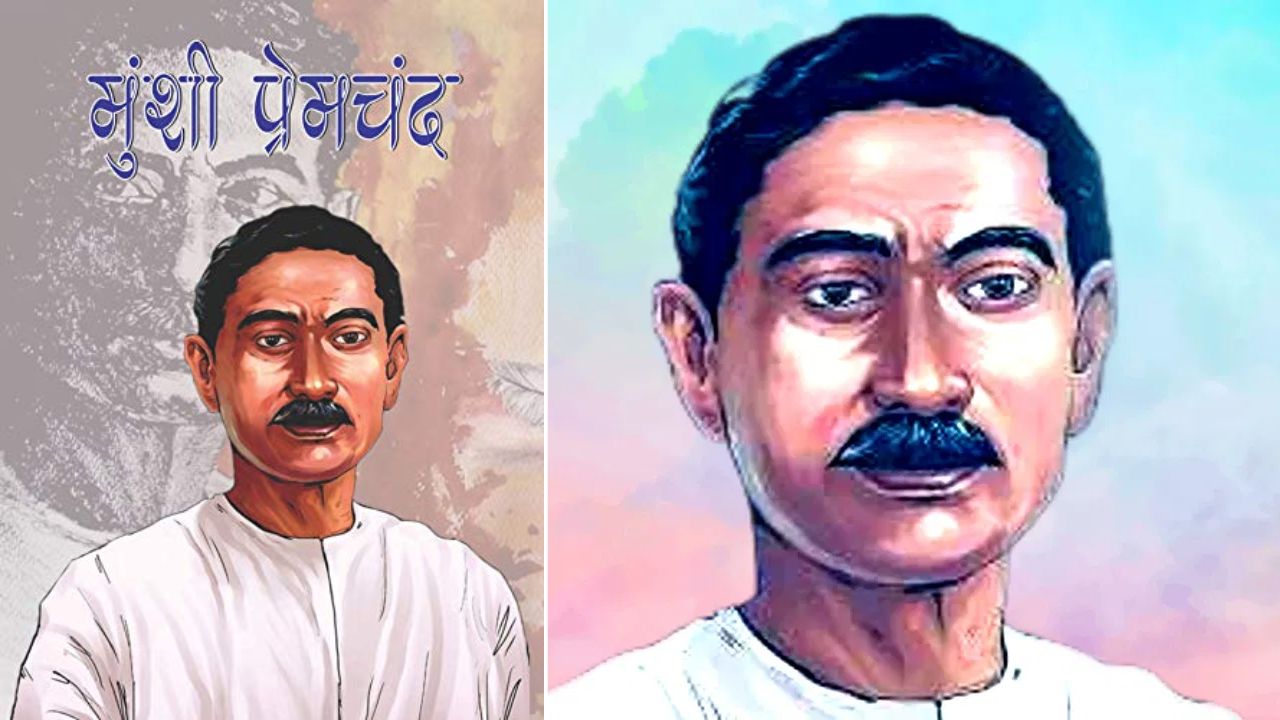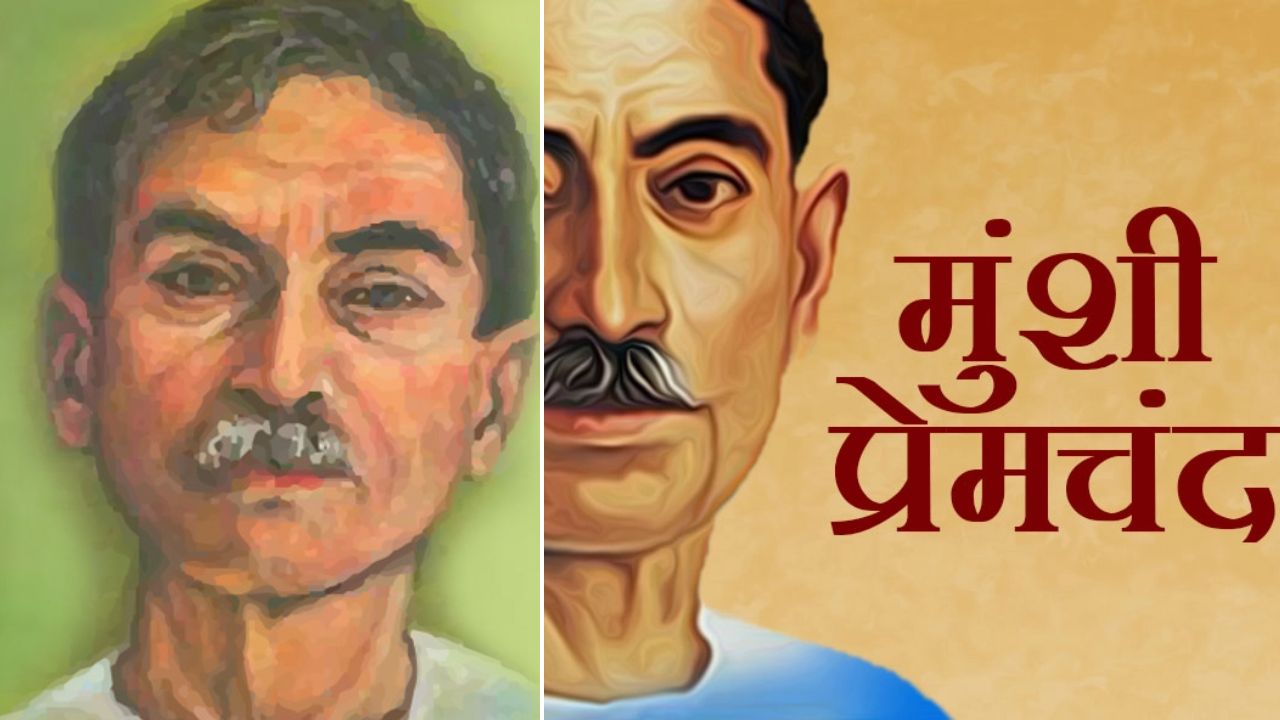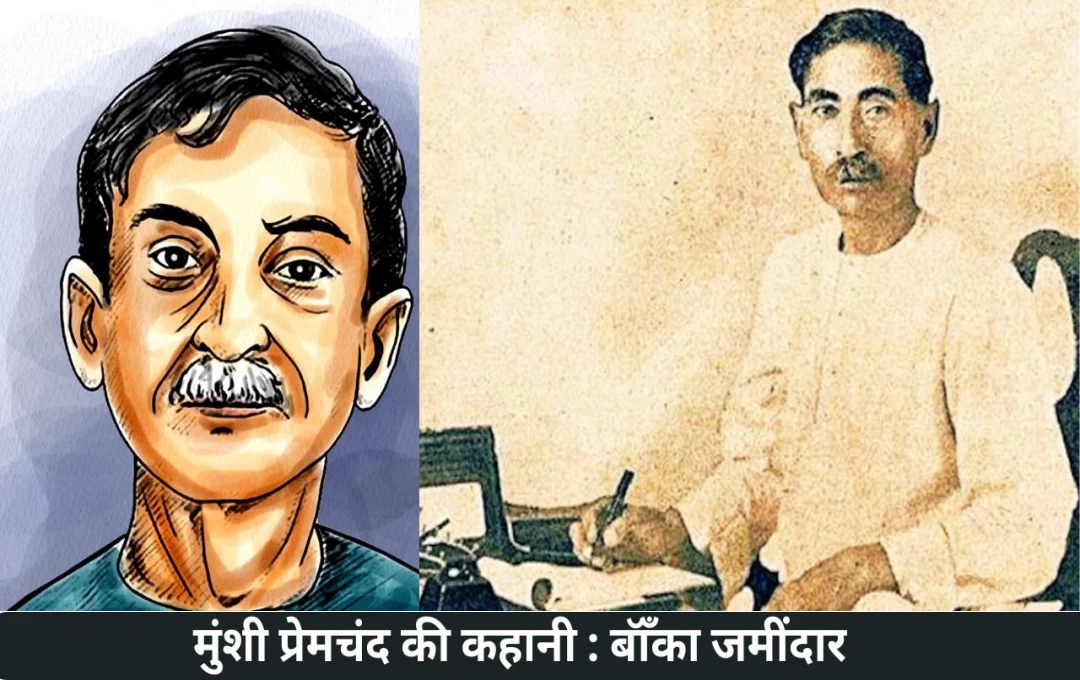Friends, our country has for centuries been the birthplace and home of numerous great personalities brimming with virtues – sages, poets, writers, musicians, and many more. The thousands of works created by these luminaries are invaluable. Today's youth, in this digital age, seem to be losing touch with their heritage, drifting further and further from this precious treasure trove. subkuz.com consistently strives to bring you these invaluable treasures alongside entertaining stories, news, and information from India and around the world. Presented here is one such invaluable and inspiring story by Munshi Premchand.
The Bountiful Zamindar
Thakur Prayudmn Singh was a renowned lawyer, famous throughout the city for his courage and boldness. His friends often remarked that his masculine prowess was most evident in the courtroom. This was the reason why, despite rarely achieving complete success in his cases, his clients' unwavering faith remained unshaken. To doubt the fearless independence of the high and mighty who sat on the seat of justice might be considered a sin, yet city insiders openly claimed that when Thakur Sahib became determined in a case, his changed demeanor and fiery expression could even sway justice itself. On more than one occasion, his tenacity and spirit had worked miracles where justice and law had failed. Moreover, Thakur Sahib was a true connoisseur of masculine virtues.
If a client possessed some wrestling skill, it wasn't necessary for them to pay money for his services. Therefore, his chambers were always filled with the city's wrestlers and bmen. This was the tremendously influential and practical legal finesse that even justice had to consider carefully before countering. He valued pride, genuine pride, from the heart. The doorways of his unpretentious home were very high; there was no need to bow. One could enter with head held high. A well-known story tells of a time he refused to take on a case despite much pleading and urging. The client was a stubborn villager. Seeing his pleas fail, he resorted to force. The lawyer fell from his chair and embraced the enraged villager.
A fascination has existed between wealth and land since time immemorial. Land possesses a special force beyond simple gravity, always drawing wealth towards itself. Interest, promissory notes, and trade are intermediate stages in the acquisition of wealth; land is its final destination. Thakur Prayudmn Singh's gaze had been fixed for a long time on a very fertile estate. However, his bank account never quite allowed him to take the plunge. Once, the zamindar of that very estate was arrested in a murder case. He had merely kept a tenant standing in the scorching sun all day as a matter of custom. But if the sun's heat, the tenant's weakness, or intense thirst proved fatal, what was the zamindar's fault? It was the city lawyers' tyranny that nobody was willing to defend him, or perhaps the zamindar's financial constraints played a role. In any case, after facing rejection everywhere, he sought refuge with Thakur Sahib. The case was extremely weak. The police had launched a full-scale investigation, and the government had prepared the latest and most up-to-date legal documents to assist them. Thakur Sahib, like experienced snake charmers, did not readily interfere, but on this occasion, he saw his ambitions faltering against the dry legal arguments. He reassured the zamindar, filed the power of attorney, and then defended the case with such vigor and determination that he emerged victorious. Public opinion attributed this victory not to his legal expertise, but to his masculine qualities, because in those days, the lawyer was more involved in the exciting aspects of wrestling than in the daunting complexities of precedents and sections. However, this seems hardly believable. Many knowledgeable people say that pomegranates and apples and grapes, thrown like projectiles, broke the police's fierce attack, ensuring that the victory remained with Thakur Sahib. The zamindar's life was saved.
Escaping death's clutches, he fell at his feet and said, "Thakur Sahib, I am not worthy of your service. God has given you so much, but Lord Krishna happily accepted the dry rice of the poor Sudama. I offer you my small, desolate ancestral estate. It's not worthy of you, but please accept it for my sake. I shall never forget your kindness." The lawyer was moved. After politely refusing a few times, he accepted the gift. His heart's desire was fulfilled.
The people of this estate were extremely rebellious and quarrelsome, proud of the fact that no zamindar had ever been able to subdue them. But when they saw their reins passing into Prayudmn Singh's hands, they forgot their defiance. Like a wild horse seeing its rider, they stood still, whinnied a little, and then bowed their heads. They understood that this was a b-willed, firm-seated rider.
It was the month of Asadh (June-July). Farmers were selling their jewelry and utensils, searching far and wide for oxen. The village's elderly moneylenders were like newlywed brides, and the starving potter was a bridegroom at a wedding; laborers were kings of opportunity. Leaky roofs awaited their benevolent gaze. The grass-covered fields needed their loving hands. They settled whomever they wished, and they deserted whomever they wished. Mischievous boys constantly raided the mango and jamun trees. Old men, with pouches hanging from their necks, wandered around from nightfall searching for drops of water, which, even in old age, was more interesting and enjoyable than food and prayers. The streams were full, the rivers boundless, greenery and prosperity everywhere. During these days, Thakur Sahib, like death, whose arrival gives no prior warning, came to the village. It was a grand wedding procession, with elephants and horses, and a retinue of guards. The village, seeing this pomp and splendor, was stunned. Horses trampled the fields, and the guards roamed the streets. In the evening, Thakur Sahib summoned his tenants and in a loud voice said, "I hear you are rebellious, and you know my style of dealing with rebellion. Now it's a confrontation of brick and stone. Do you agree?"
An old farmer, trembling like a banyan tree, replied, "Sir, you are our king. Where can we go against you?"
Thakur Sahib, changing his tone, said, "Then all of you submit three years' advance land revenue by tomorrow morning. And listen carefully, I don't repeat orders; otherwise, I will have the fields plowed over and turn your houses into fields."
Chaos erupted throughout the village. Collecting three years' advance revenue so quickly was impossible. The night was spent in this state of anxiety. The hope for the lightning-fast effect of pleas still remained. When morning arrived, it came as a catastrophe. On the one hand, the market for coercion and injustice was hot; on the other, there were weeping eyes, cold sighs, and screams, with no one to listen. Poor farmers, laden with their belongings, looked helplessly, their eyes filled with supplication, carrying their wives and children, crying and wailing, leaving for an unknown land. By evening, the village was deserted.
This news quickly spread. People began to doubt Thakur Sahib's humanity. The village lay desolate. Who would populate it? Whose children would play in its streets? Whose women would draw water from its wells? Travelers passing by saw this scene of devastation and lamented. It is unknown what the poor villagers went through in that desolate land. Ah, those who had eaten the fruits of their labor and walked with their heads held high were now enslaved by others.
A year passed. Then the village's fortunes changed. The land was fertile. The houses were there. Slowly, this tale of oppression faded. The covetous eyes of the mischievous farmers fell upon it. 'By chance, the landlord is cruel, merciless, harsh; we will appease him. What matters is the three years' advance revenue. We will please him. We will consider his abuses as blessings; we will place his shoes on our heads and eyes. He is the king; we are his servants.' How difficult it is to maintain self-respect in the struggle and battles of life! When the next Asadh arrived, the village was once again a garden. Children built houses at their doorsteps; the men's loud songs were heard in the fields, and the women's sweet songs were heard at the mills. The enchanting scenes of life became visible again.
A year passed. When the second rabi crop arrived, seeing the golden ears of corn waving in the fields, the hearts of the farmers began to dance. The fallow land had yielded gold. The women were happy that they would now buy new jewelry, the men were happy that they would buy fine oxen, and the Daroga's happiness knew no bounds. When Thakur Sahib heard this good news, he went for a country outing. The same pomp, the same retinue of guards, the same army of thugs! The villagers began making preparations for their welcome. A whole herd of fat goats was tied at the entrance of the village square, piles of wood were stacked, and milk pots were filled. When Thakur Sahib reached the village boundary, about a hundred men stood with folded hands to welcome him. But the first thing he requested was lemonade and ice. The tenants were taken aback. A bottle of water could have been sold at exorbitant prices at that moment. But the poor villagers did not know the ways of the rich. They stood stunned, heads bowed like criminals. Shame and embarrassment were etched on their faces; fear and palpitations in their hearts. "God! Things have gone wrong, only you can save us now."
Without the coolness of ice, Thakur Sahib's thirst intensified; his anger flared up. He thundered, "I am not a devil to quench my thirst with goat's blood; I need cold ice, and this thirst will only be quenched by your tears and the tears of your women. Ungrateful wretches! I gave you land, houses, and status, and in return, this is what you offer—that I should thirst for water! You are not worthy of any leniency. By tomorrow evening, I don't want to see the face of a single person in this village; otherwise, there will be a catastrophe. You know I don't repeat my orders. The night is yours; take whatever you can. But in the evening, I don't want to see any wretched faces. This crying and screaming is useless; my heart is stone, my liver is iron; I am not moved by tears."

And so it happened. By the second night, there was not a single person left to light a lamp in the entire village. The flourishing village became a haunted place.
For many years, this incident remained a treasure trove of interesting stories for the gossipers in the surrounding areas. A gentleman even wrote about it. Poor Thakur Sahib was so disgraced that it became difficult for him to leave the house. He tried hard to repopulate the village, but no one dared to set foot in that dark city where the punishment for prosperity was death. Some laborers came to try their luck, but they could not stay for more than a few months. A deserted village is like lost trust, which is very difficult to regain. Finally, when nothing worked, Thakur Sahib was forced to publicly announce the remission of land revenue, but he lost the remaining credibility of his rule. After three years, a caravan of Banjaras (nomadic tribes) arrived one day. It was evening, and waves of darkness were rising from the east. The Banjaras saw that the entire village was deserted, with vultures and jackals inhabiting the homes. They could not understand the mystery. The houses were there, the land was fertile, the fields were lush with greenery, but there were no people! There was no other village nearby, so they set up camp there. When morning came, the bells around the necks of the oxen began their silvery music again, and as the caravan moved away from the village, a shepherd told them the long story of the oppression. Their travels around the world had made them accustomed to hardships. They conferred amongst themselves and made a decision. They went to Thakur Sahib's doorstep and offered their respects. The village was repopulated.
These Banjaras were exceptionally brave, people of iron will and determination. With their arrival, Lakshmi (Goddess of wealth) reigned in the village. Once again, smoke billowed from the houses, the axes again donned their shrouds of smoke and steam, and lamps were lit again on the Tulsi platforms. At night, the songs of young men with colorful voices could be heard. The herds of cattle again appeared in the pastures, and the faint and sweet sound of a shepherd's flute sitting under a tree created a magical charm in this scene of pain and impact.
It was the month of Bhado (August-September). The crimson and white smoothness of cotton flowers, the abundant sesame harvest, and the flamboyant yellow of flax showed their beauty. The prosperity of fruits and flowers was visible on the farmers' threshing floors and thatched roofs. Light showers of rain were adorning nature's beauty. Just as the hearts of ascetics are filled with the light of truth, so were the oceans and ponds filled with clear water. Perhaps Indra, the king of the gods, was descending from the cool heights of Kailash to the plains. Therefore, nature had opened the stores of beauty, achievements, and hopes. The lawyer too was tempted by an outing. As always, he arrived in the village with his aristocratic style. He saw that the blessings of contentment and peace were evident everywhere.
The villagers greeted him, announcing his auspicious arrival. The lawyer saw them wearing fine clothes, walking with pride. He smiled warmly at them and inquired about the harvest. Old Haridas, in a tone that exuded full responsibility and the dignity of a chieftain, replied, "By the grace of your feet, all is well. There is no trouble. We eat from your bounty and sing your praises. Our king and ruler, whoever it is, is you, and our lives are at your disposal."
Thakur Sahib, changing his tone, said, "I am not accustomed to listening to flattery."
A frown appeared on Old Haridas's forehead; his pride was hurt. He said, "Neither am I accustomed to flattery."
Thakur Sahib retorted, "You don't know how to talk to nobles. Like your strength, your intelligence has also succumbed to old age."
Haridas looked towards his companions. Anger filled their eyes, while their brows were furrowed with patience. He said, "We are your subjects, but we hold our honor dear, and even if you, the zamindar, give your own head, we cannot give our honor."
Many of Haridas's defiant companions voiced their support: "Honor is after life."
Thakur Sahib's anger flared, his face reddening. He shouted, "Watch your tongues, or you will be driven out as you came, with pouches hanging from your necks. I am Prayudmn Singh, who has crushed hundreds like you in this very place." Saying this, he called Arjun Singh, the leader of his retinue, and said, "Thakur, these ants have grown wings; by tomorrow evening, my village must be cleared of these people."

Haridas stood up. Anger now blazed in his eyes. He said, "We did not build this village to leave it. As long as we live, we will live in this village; we will be born here and die here. You are a great man, and great men have great understanding. We are stubborn villagers. Do not needlessly chase after the lives of the poor. There will be bloodshed. But if you insist, we challenge your soldiers; whenever you want, unleash your wrath."
Saying this, he saluted Thakur Sahib and left. His companions walked away with pride. Arjun Singh saw their demeanor. He understood that these were men of iron, but he was the leader of the guards, and he had some pride in his name. The next day in the evening, when night and day were clashing, these two groups clashed. Then there was a great fight that shook the ground. The tongues showed such force within the mouths that the sun hid in the west in fear. Then the sticks rose, but before they could receive the blessings and thanks of the doctor, Arjun Singh acted wisely. However, some of his men had already drunk jaggery and turmeric water.
Seeing the plight of his army—some with torn clothes, some with dirt on their bodies, some gasping for breath (little blood was seen because it is a precious thing and was saved from the beating of sticks)—Thakur Sahib patted Arjun Singh's back and greatly praised his bravery and valor. That night, there was such a rain of laddoos (sweet treats) and imartis (sweet fritters) in front of them that all the dirt and dust was washed away. The next morning, this retinue took the path home, swearing never to set foot in this village again.
Then Thakur Sahib summoned the villagers to the village square. At his signal, everyone gathered. Authority and rule, if it descends from the throne of arrogance, can even make enemies friends. When everyone had arrived, Thakur Sahib spoke to them one by one, clasping their arms and saying, "I am deeply indebted to God that I found the people I was looking for for this village. You know that this village has been deserted and rebuilt many times. The reason was that these people did not meet my standards. I was not their enemy, but my heartfelt desire was that those people should flourish in this village who would face oppression like men, who would protect their rights and privileges like men, who would not be slaves to authority, who would not cower in fear like children at the stern gaze of authority. I am confident that after much loss, embarrassment, and disgrace, my desires have been fulfilled. I am confident that you will successfully deal with adverse winds and high waves. I am withdrawing my hand from this village today. From today, it is your property. You are its zamindars and owners. My only prayer to God is that you may prosper and flourish."
These words worked magic on their hearts. The people, overwhelmed with devotion, clung to Thakur Sahib's feet and said, "We will not be separated from your feet in this life. Where will we find a benefactor and ruler like you?" A very touching and impactful scene of the devotion and empathy, loyalty, and gratitude of the warriors unfolded before their eyes. But Thakur Sahib remained firm in his generous decision. More than fifty years have passed, but the descendants of those Banjaras are still the custodians of the Saheshganj estate. Women still worship and make offerings to Thakur Prayudmn Singh, and even though many young men of this estate have reached the heights of wealth and power, they still take pride in the name of the stubborn and defiant Haridas, and even today, they celebrate the anniversary of that auspicious victory on Bhado Sukh Ekadashi.
Keep reading such inspiring and informative stories on subkuz.com.







